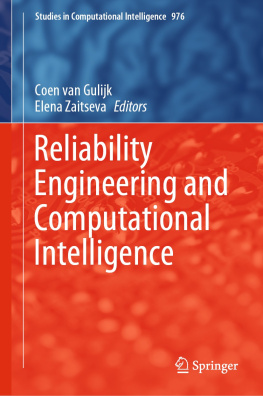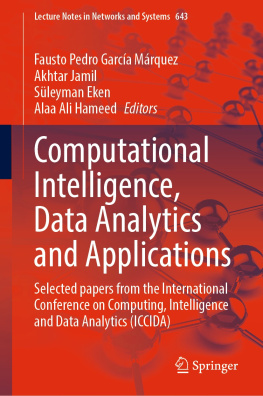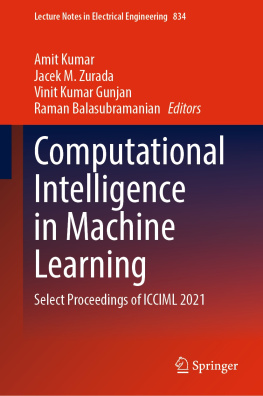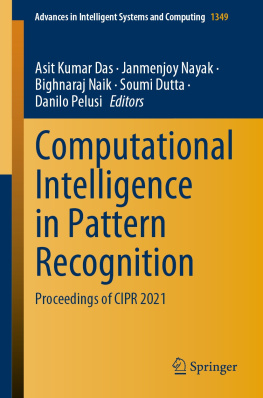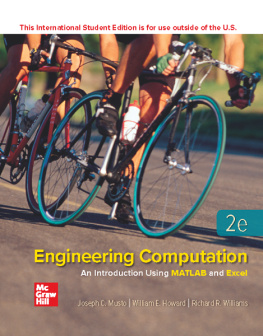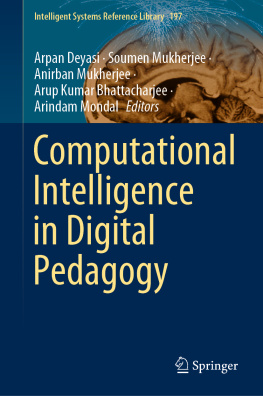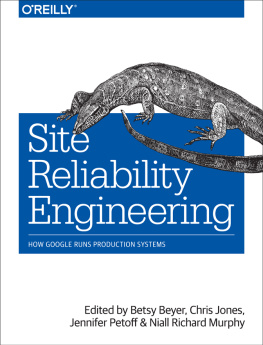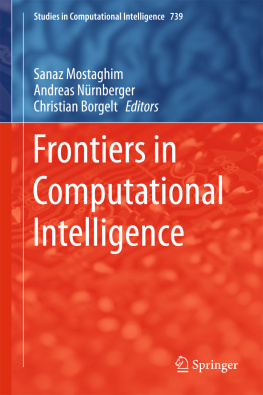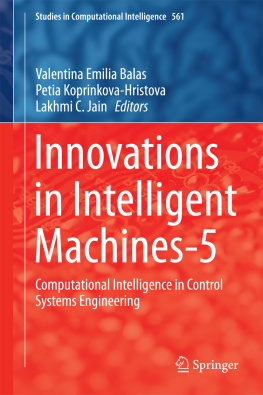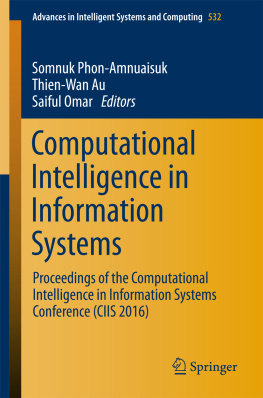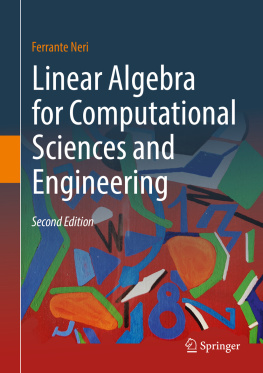Coen van Gulijk - Reliability Engineering and Computational Intelligence
Here you can read online Coen van Gulijk - Reliability Engineering and Computational Intelligence full text of the book (entire story) in english for free. Download pdf and epub, get meaning, cover and reviews about this ebook. year: 2021, publisher: Springer International Publishing, genre: Computer. Description of the work, (preface) as well as reviews are available. Best literature library LitArk.com created for fans of good reading and offers a wide selection of genres:
Romance novel
Science fiction
Adventure
Detective
Science
History
Home and family
Prose
Art
Politics
Computer
Non-fiction
Religion
Business
Children
Humor
Choose a favorite category and find really read worthwhile books. Enjoy immersion in the world of imagination, feel the emotions of the characters or learn something new for yourself, make an fascinating discovery.
- Book:Reliability Engineering and Computational Intelligence
- Author:
- Publisher:Springer International Publishing
- Genre:
- Year:2021
- Rating:4 / 5
- Favourites:Add to favourites
- Your mark:
- 80
- 1
- 2
- 3
- 4
- 5
Reliability Engineering and Computational Intelligence: summary, description and annotation
We offer to read an annotation, description, summary or preface (depends on what the author of the book "Reliability Engineering and Computational Intelligence" wrote himself). If you haven't found the necessary information about the book — write in the comments, we will try to find it.
Reliability Engineering and Computational Intelligence — read online for free the complete book (whole text) full work
Below is the text of the book, divided by pages. System saving the place of the last page read, allows you to conveniently read the book "Reliability Engineering and Computational Intelligence" online for free, without having to search again every time where you left off. Put a bookmark, and you can go to the page where you finished reading at any time.
Font size:
Interval:
Bookmark:
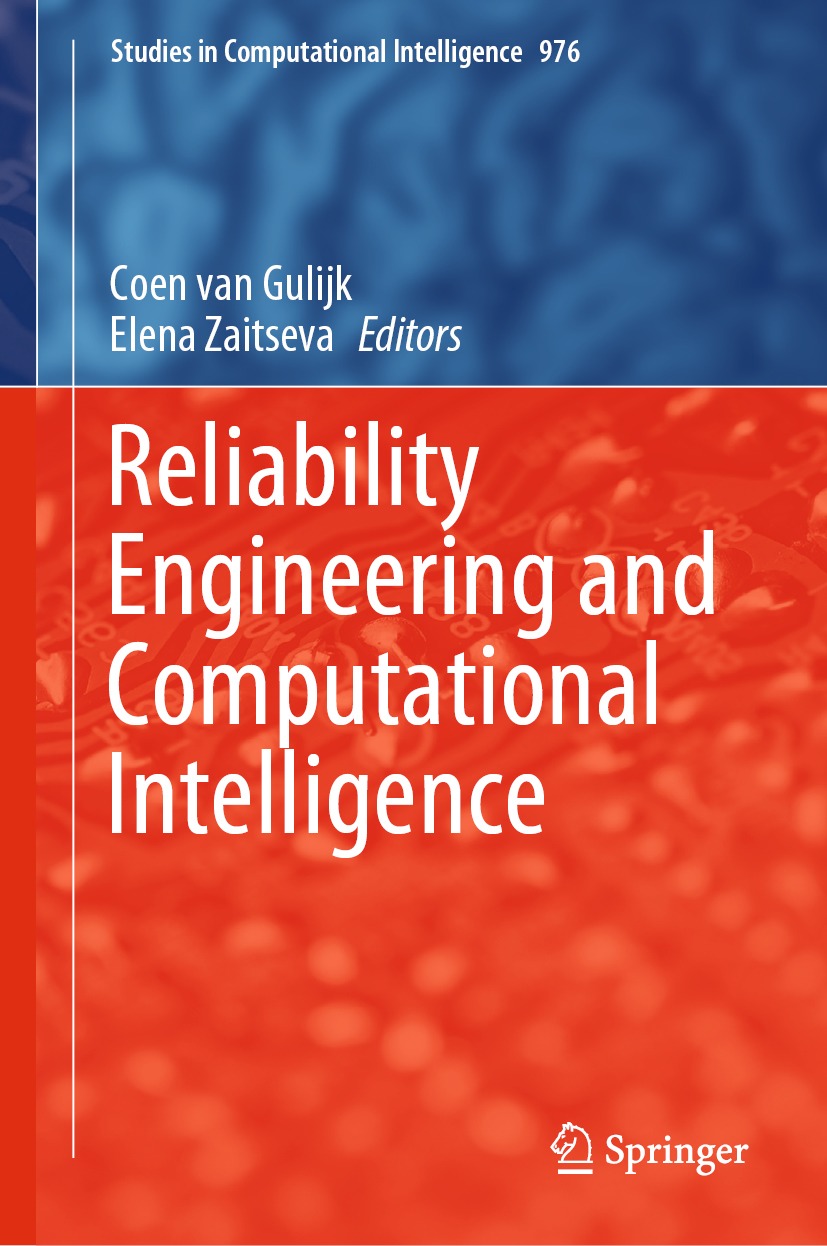
The series Studies in Computational Intelligence (SCI) publishes new developments and advances in the various areas of computational intelligencequickly and with a high quality. The intent is to cover the theory, applications, and design methods of computational intelligence, as embedded in the fields of engineering, computer science, physics and life sciences, as well as the methodologies behind them. The series contains monographs, lecture notes and edited volumes in computational intelligence spanning the areas of neural networks, connectionist systems, genetic algorithms, evolutionary computation, artificial intelligence, cellular automata, self-organizing systems, soft computing, fuzzy systems, and hybrid intelligent systems. Of particular value to both the contributors and the readership are the short publication timeframe and the world-wide distribution, which enable both wide and rapid dissemination of research output.
Indexed by SCOPUS, DBLP, WTI Frankfurt eG, zbMATH, SCImago.
All books published in the series are submitted for consideration in Web of Science.
More information about this series at http://www.springer.com/series/7092

This Springer imprint is published by the registered company Springer Nature Switzerland AG
The registered company address is: Gewerbestrasse 11, 6330 Cham, Switzerland
This volume addresses the fusion between two scientific domains: reliability engineering and computational intelligence. Reliability engineering is an established domain that has a very good practical and scientific background for the analysis of the reliability of systems. Computational intelligence is relatively new in reliability engineering. But it has been an equally well-established branch of research with many groups over the world attempting to develop useful computational intelligence tools in different fields. Today, the continuous drive for digitalization causes reliability engineering and computational intelligence to merge. Combining the fields paves the way to progress on big data analytics, uncertain information evaluation, reasoning, prediction, modeling, optimization, decision making, and of course: more reliable systems.
The RECI workshop was held to discuss the merger of reliability engineering and computational intelligence and progress in the field. The workshop was an online scientific event held from October 2729, 2020 ( htps://ki.fri.uniza.sk/RECI2020/ ). This volume combines several papers submitted to the workshop. Out of 68 submissions for paper, 47 were selected for discussion and after review by 2 or 3 peers, 18 were accepted for publication in this volume.
Although there was some overlap in the papers, progress tended to cluster around three subjects: mathematical methods for RECI, digital techniques for RECI, and progress in RECI applications of which most are based on image analysis. The works in this volume are organized according to these clusters. The first cluster focuses on mathematical techniques and is entitled Mathematical and computational intelligence methods in reliability engineering. This cluster contains papers explaining system reliability techniques based on logic differential calculus and Hesse diagrams, survival signatures, fuzzy random forests, syntax trees, failure-based prevention models, and filtering algorithms for convolutional neural networks.
The second cluster focuses on subjects for digital techniques that are equally varied discussing: Digital technologies in reliability engineering. Starting from relatively abstract insights of how digital modeling technologies could replace mathematical modeling, building safety assurance cases for software, and a business approach to RECI. And moving into practicalities for hyperconverged systems, reliability of distributed processing and energy optimization of IoT systems.
Progress on image analysis is reported on: image superresolution, weights standardization in neural network techniques, deep learning, autonomous units for reliable monitoring, and complex monitoring systems (though the last two dont just treat image analysis). And last but not least progress is reported on Covid-19. This last cluster is entitled: Image analysis and other applications of computational intelligence in reliability engineering.
We believe that the work recorded in this volume is relevant for scientists interested in fusing problems of reliability engineering and computational intelligence. Whether they be researchers from an academic or business background, whether they be dealing with risk and reliability analysis or computational intelligence, we believe this work contributes to their understanding of the subject. We believe that the work is equally useful for IT companies traditionally working on computational intelligence, and developers of engineering systems traditionally working on reliability engineering.
We thank the local organizers for their efforts in making the workshop a successful one. We thank all authors and reviewers for their excellent contributions and we thank our funders through the Advanced Centre for Ph.D. Students and Young Researchers in InformaticsACeSYRI (610166-EPP-1-2019-1-SK-EPPKA2-CBHE-JP) of the European Unions Erasmus+ programme and New Methods Development for Reliability Analysis of Complex System (APVV-18-0027) of the Slovak Research and Development Agency.
Font size:
Interval:
Bookmark:
Similar books «Reliability Engineering and Computational Intelligence»
Look at similar books to Reliability Engineering and Computational Intelligence. We have selected literature similar in name and meaning in the hope of providing readers with more options to find new, interesting, not yet read works.
Discussion, reviews of the book Reliability Engineering and Computational Intelligence and just readers' own opinions. Leave your comments, write what you think about the work, its meaning or the main characters. Specify what exactly you liked and what you didn't like, and why you think so.

